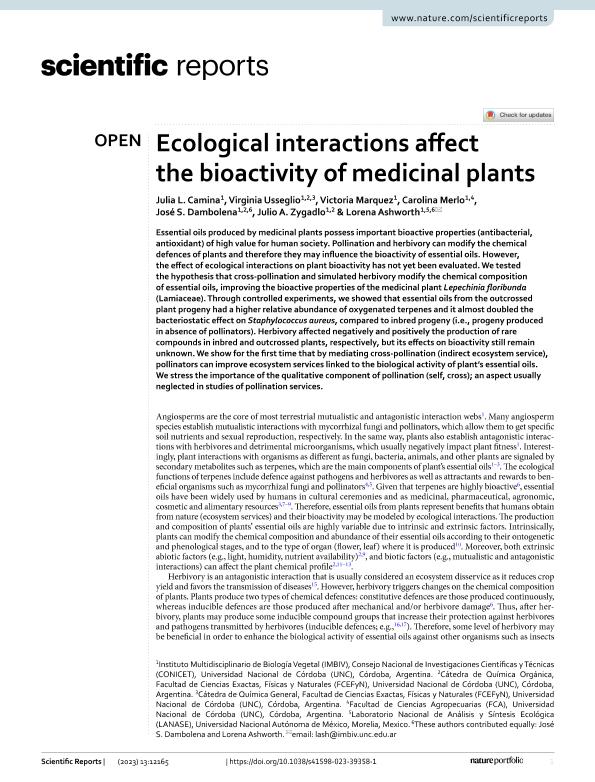Mostrar el registro sencillo del ítem
dc.contributor.author
Camina, Julia Laura

dc.contributor.author
Usseglio, Virginia Lara

dc.contributor.author
Marquez, Victoria

dc.contributor.author
Merlo, Carolina

dc.contributor.author
Dambolena, José Sebastián

dc.contributor.author
Zygadlo, Julio Alberto

dc.contributor.author
Ashworth, Lorena

dc.date.available
2023-12-04T18:00:39Z
dc.date.issued
2023-12
dc.identifier.citation
Camina, Julia Laura; Usseglio, Virginia Lara; Marquez, Victoria; Merlo, Carolina; Dambolena, José Sebastián; et al.; Ecological interactions affect the bioactivity of medicinal plants; Nature Research; Scientific Reports; 13; 1; 12-2023; 1-10
dc.identifier.uri
http://hdl.handle.net/11336/219270
dc.description.abstract
Essential oils produced by medicinal plants possess important bioactive properties (antibacterial, antioxidant) of high value for human society. Pollination and herbivory can modify the chemical defences of plants and therefore they may influence the bioactivity of essential oils. However, the effect of ecological interactions on plant bioactivity has not yet been evaluated. We tested the hypothesis that cross-pollination and simulated herbivory modify the chemical composition of essential oils, improving the bioactive properties of the medicinal plant Lepechinia floribunda (Lamiaceae). Through controlled experiments, we showed that essential oils from the outcrossed plant progeny had a higher relative abundance of oxygenated terpenes and it almost doubled the bacteriostatic effect on Staphylococcus aureus, compared to inbred progeny (i.e., progeny produced in absence of pollinators). Herbivory affected negatively and positively the production of rare compounds in inbred and outcrossed plants, respectively, but its effects on bioactivity still remain unknown. We show for the first time that by mediating cross-pollination (indirect ecosystem service), pollinators can improve ecosystem services linked to the biological activity of plant’s essential oils. We stress the importance of the qualitative component of pollination (self, cross); an aspect usually neglected in studies of pollination services.
dc.format
application/pdf
dc.language.iso
eng
dc.publisher
Nature Research
dc.rights
info:eu-repo/semantics/openAccess
dc.rights.uri
https://creativecommons.org/licenses/by-nc-sa/2.5/ar/
dc.subject
POLLINATION QUALITY
dc.subject
INBREEDING
dc.subject
BIOACTIVITY
dc.subject
ECOSYSTEM SERVICES
dc.subject
TERPENES
dc.subject.classification
Ecología

dc.subject.classification
Ciencias Biológicas

dc.subject.classification
CIENCIAS NATURALES Y EXACTAS

dc.title
Ecological interactions affect the bioactivity of medicinal plants
dc.type
info:eu-repo/semantics/article
dc.type
info:ar-repo/semantics/artículo
dc.type
info:eu-repo/semantics/publishedVersion
dc.date.updated
2023-10-23T13:28:57Z
dc.identifier.eissn
2045-2322
dc.journal.volume
13
dc.journal.number
1
dc.journal.pagination
1-10
dc.journal.pais
Reino Unido

dc.description.fil
Fil: Camina, Julia Laura. Consejo Nacional de Investigaciones Científicas y Técnicas. Centro Científico Tecnológico Conicet - Córdoba. Instituto Multidisciplinario de Biología Vegetal. Universidad Nacional de Córdoba. Facultad de Ciencias Exactas Físicas y Naturales. Instituto Multidisciplinario de Biología Vegetal; Argentina
dc.description.fil
Fil: Usseglio, Virginia Lara. Universidad Nacional de Córdoba; Argentina. Consejo Nacional de Investigaciones Científicas y Técnicas. Centro Científico Tecnológico Conicet - Córdoba. Instituto Multidisciplinario de Biología Vegetal. Universidad Nacional de Córdoba. Facultad de Ciencias Exactas Físicas y Naturales. Instituto Multidisciplinario de Biología Vegetal; Argentina
dc.description.fil
Fil: Marquez, Victoria. Consejo Nacional de Investigaciones Científicas y Técnicas. Centro Científico Tecnológico Conicet - Córdoba. Instituto Multidisciplinario de Biología Vegetal. Universidad Nacional de Córdoba. Facultad de Ciencias Exactas Físicas y Naturales. Instituto Multidisciplinario de Biología Vegetal; Argentina
dc.description.fil
Fil: Merlo, Carolina. Consejo Nacional de Investigaciones Científicas y Técnicas. Centro Científico Tecnológico Conicet - Córdoba. Instituto Multidisciplinario de Biología Vegetal. Universidad Nacional de Córdoba. Facultad de Ciencias Exactas Físicas y Naturales. Instituto Multidisciplinario de Biología Vegetal; Argentina
dc.description.fil
Fil: Dambolena, José Sebastián. Consejo Nacional de Investigaciones Científicas y Técnicas. Centro Científico Tecnológico Conicet - Córdoba. Instituto Multidisciplinario de Biología Vegetal. Universidad Nacional de Córdoba. Facultad de Ciencias Exactas Físicas y Naturales. Instituto Multidisciplinario de Biología Vegetal; Argentina
dc.description.fil
Fil: Zygadlo, Julio Alberto. Consejo Nacional de Investigaciones Científicas y Técnicas. Centro Científico Tecnológico Conicet - Córdoba. Instituto Multidisciplinario de Biología Vegetal. Universidad Nacional de Córdoba. Facultad de Ciencias Exactas Físicas y Naturales. Instituto Multidisciplinario de Biología Vegetal; Argentina. Universidad Nacional de Córdoba; Argentina
dc.description.fil
Fil: Ashworth, Lorena. Consejo Nacional de Investigaciones Científicas y Técnicas. Centro Científico Tecnológico Conicet - Córdoba. Instituto Multidisciplinario de Biología Vegetal. Universidad Nacional de Córdoba. Facultad de Ciencias Exactas Físicas y Naturales. Instituto Multidisciplinario de Biología Vegetal; Argentina
dc.journal.title
Scientific Reports
dc.relation.alternativeid
info:eu-repo/semantics/altIdentifier/url/https://www.nature.com/articles/s41598-023-39358-1
dc.relation.alternativeid
info:eu-repo/semantics/altIdentifier/doi/http://dx.doi.org/10.1038/s41598-023-39358-1
Archivos asociados
